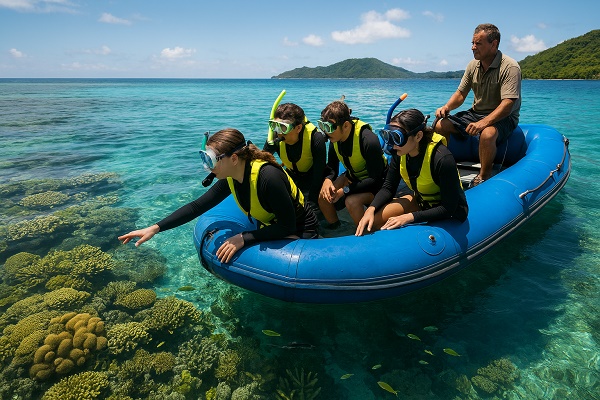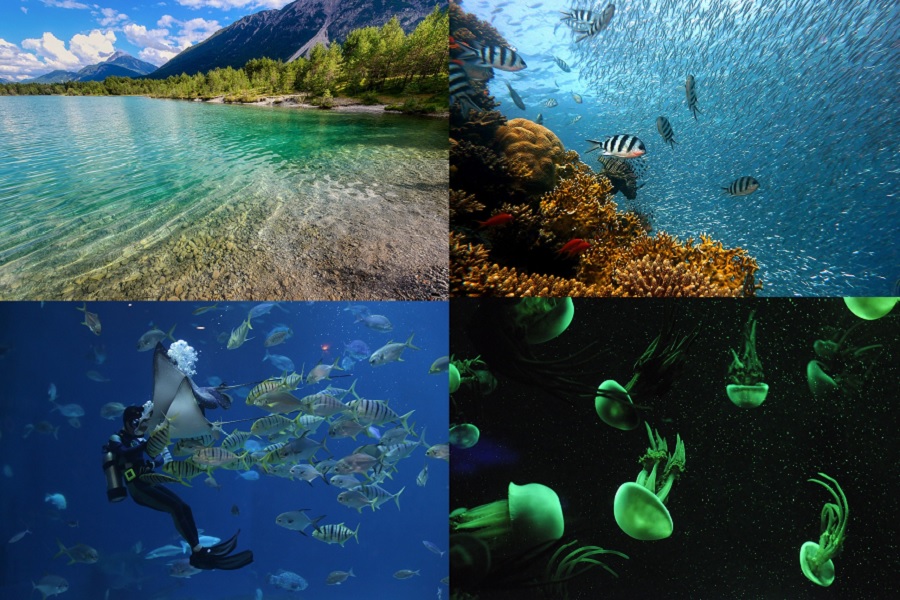Ecotourism Travel: Exploring the World with a Conscience

In a world where sustainable practices are becoming increasingly important, ecotourism is rapidly emerging as a preferred choice for travelers looking to explore the beauty of nature while minimizing their environmental impact. Ecotourism is more than just a travel trend; it’s a philosophy that encourages responsible travel to natural areas, aiming to conserve the environment, respect local cultures, and improve the well-being of local communities.
As global awareness around environmental conservation grows, ecotourism provides an avenue for travelers to engage with nature in a way that promotes sustainability. From exploring lush rainforests to staying at eco-friendly resorts, the rise of ecotourism has reshaped the way people approach travel. Here's why ecotourism is not just a trend but a movement towards a more sustainable future.
What is Ecotourism?
Ecotourism can be defined as responsible travel to natural areas that conserves the environment, sustains the well-being of local people, and involves interpretation and education. It is a way for travelers to visit pristine areas with minimal impact on the environment, often including activities such as wildlife watching, hiking, volunteering, and engaging in cultural exchange with indigenous communities.
Unlike traditional tourism, which can sometimes harm local ecosystems, ecotourism prioritizes sustainability. Travelers who choose ecotourism seek to experience nature's wonders without causing harm to the places they visit. It fosters the idea that the preservation of nature can go hand in hand with local development, creating a symbiotic relationship between tourism and conservation.
Key Principles of Ecotourism
-
Environmental Conservation One of the core principles of ecotourism is environmental conservation. This includes ensuring that the natural habitats of wildlife are preserved, supporting sustainable resource management practices, and protecting endangered species. Ecotourism promotes minimal environmental impact by encouraging practices like waste reduction, energy conservation, and supporting eco-friendly accommodations and transport options.
-
Community Involvement Ecotourism involves local communities in tourism-related decision-making. It’s about giving back to the communities that host tourists and ensuring that they benefit economically from tourism. Local guides, artisans, and small businesses often play a crucial role in ecotourism destinations, and their cultural practices are preserved and respected.
-
Sustainability Sustainability is at the heart of ecotourism. The aim is to support sustainable practices in all aspects of travel, from the accommodations you choose to the activities you participate in. Ecotourists are encouraged to be mindful of their ecological footprint and choose experiences that align with environmental responsibility.
-
Education and Awareness Ecotourism emphasizes the educational aspect of travel. Whether it’s learning about local ecosystems, wildlife, or conservation efforts, ecotourists are encouraged to immerse themselves in the educational opportunities that travel provides. This helps raise awareness about the importance of conservation and the need for responsible tourism practices.
Top Ecotourism Destinations Around the World
-
Costa Rica: A Paradise for Nature Lovers Costa Rica is a global leader in ecotourism, with its vast biodiversity and national parks. The country is home to lush rainforests, volcanic landscapes, pristine beaches, and abundant wildlife, making it a top destination for ecotourism. Visitors can explore Corcovado National Park, a UNESCO World Heritage site, and take part in guided wildlife tours to spot rare species such as sloths, toucans, and monkeys.
- Ecotourism Tip: Stay in eco-lodges, many of which are built using sustainable materials and renewable energy, and participate in activities like birdwatching or nature hikes to minimize your impact.
-
New Zealand: A Natural Playground New Zealand is renowned for its awe-inspiring landscapes, from fjords and mountains to beaches and forests. The country places great emphasis on preserving its natural beauty, and it offers a variety of ecotourism experiences. Tourists can visit Fiordland National Park, known for its fjords and native wildlife, or explore the famous Abel Tasman Coast Track.
- Ecotourism Tip: Consider hiking the Tongariro Alpine Crossing or visiting the Waitomo Caves for an eco-friendly adventure that doesn’t harm the natural surroundings.
-
Galápagos Islands, Ecuador: A Living Laboratory The Galápagos Islands are often considered one of the best ecotourism destinations in the world. Known for their unique wildlife and pristine environment, the islands offer the chance to see species found nowhere else on Earth. Visitors can explore the islands' diverse ecosystems, snorkel with sea lions, and hike volcanic craters, all while learning about the ongoing conservation efforts to preserve the delicate environment.
- Ecotourism Tip: Choose tours that follow strict conservation guidelines, such as small-group tours that limit the number of visitors to protected areas and reduce environmental impact.
-
Bhutan: The Kingdom of Happiness Bhutan is a pioneer in ecotourism and sustainability, with its commitment to preserving culture and nature. The country has adopted the concept of "Gross National Happiness" and ensures that its tourism industry aligns with this philosophy. Visitors can explore the majestic Himalayan mountains, visit ancient monasteries, and witness the country’s unique wildlife, all while supporting sustainable practices.
- Ecotourism Tip: Bhutan’s government encourages visitors to choose eco-friendly hotels and stay for a longer duration to minimize the carbon footprint of travel.
-
Norway: The Land of Fjords and Wildlife Norway offers a perfect blend of adventure and conservation, making it a top destination for ecotourists. The country's fjords, mountains, and coastal islands provide ideal settings for outdoor activities such as kayaking, hiking, and whale watching. Norway is also known for its commitment to environmental sustainability and renewable energy sources.
- Ecotourism Tip: Visit the Lofoten Islands, a remote archipelago, and explore its rugged beauty while participating in sustainable tourism initiatives that support local communities.
-
Kenya: Wildlife Conservation and Safari Adventures Kenya’s wildlife safaris offer ecotourists the chance to observe majestic animals like lions, elephants, and giraffes in their natural habitats. The country is home to numerous national parks and reserves, including the Maasai Mara, where sustainable practices are used to protect both wildlife and local communities. Visitors can stay in eco-lodges that support conservation efforts and reduce their environmental impact.
- Ecotourism Tip: Book a safari with operators who contribute to wildlife conservation and community development, ensuring that your travel helps protect endangered species.
How to Be a Responsible Ecotourist
-
Choose Eco-Friendly Accommodations Select accommodations that follow sustainable practices, such as using solar power, minimizing water usage, and supporting local businesses. Eco-lodges and green hotels are excellent choices.
-
Respect Local Cultures Always respect the cultures and traditions of the people you meet while traveling. Learning about the history and values of local communities enhances the travel experience and supports cultural preservation.
-
Support Local Conservation Efforts Many ecotourism destinations rely on funding from tourism to support their conservation efforts. Contribute to wildlife conservation projects, local environmental organizations, or even participate in volunteer opportunities.
-
Minimize Your Environmental Impact Be mindful of your carbon footprint. Opt for sustainable transportation options, such as trains or buses, instead of flying, and always follow the Leave No Trace principles when exploring natural areas.
Conclusion
Ecotourism is about experiencing the beauty of the world while ensuring that future generations can enjoy it as well. By choosing destinations that prioritize environmental sustainability and supporting local communities, travelers can make a positive impact on the places they visit. Whether it's exploring rainforests, observing wildlife, or learning about indigenous cultures, ecotourism offers enriching travel experiences that allow us to connect with nature and contribute to its preservation.
























